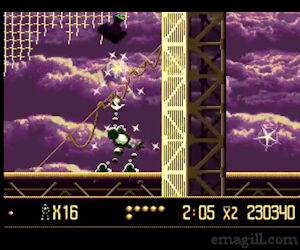

The player maneuvers the main character, Vectorman through levels by running and jumping, and attacking enemies through projectile attacks, similar to games such as Gunstar Heroes, Contra, and Mega Man. The game plays as a 2D action platformer. A sequel, Vectorman 2, was released in 1996, but despite several abandoned attempts at a third entry, no further games have been released.

In subsequent decades, the game was re-released across many Sega-themed video game compilations, and on its own across the Wii Virtual Console, Steam, and the Sega Forever line of mobile game releases. It was considered a critical and commercial success, achieving its dual goal of retaining interest in the aging Sega Genesis platform in face of the increasingly popular new technology of the next generation of video game consoles and providing competition to industry competitor Nintendo's popular Donkey Kong Country video game. The game was released for the Sega Genesis in late 1995 in North America and Europe. With seven distinct versions, it also has the largest number of licensed versions of any console.Vectorman is a 2D action platformer video game developed by BlueSky Software and published by Sega. The Genesis also supported a number of add-on components (32X, CD, Power Base Converter), making it one of the most flexible systems ever developed.

The Genesis could do things that the NES simply couldn't. Sega also focused attention on its better graphics, speed, and sound, especially after the release of Sonic. Sega marketed the Genesis as hip, cool, and edgy. These efforts were often successful, Nintendo Exclusivity Clause not-withstanding. In addition to porting over popular coin-op games, Sega executives worked hard to lure developers away from Nintendo. The Genesis was developed with the American market and consumer in mind. They are even available for download on the Nintendo Wii Virtual Console. Genesis games are re-released even today as part of collector's editions for the PS2, PSP, and other systems. Games continued to be released internationally as recently as 2002. It was the first successful 16-bit system, with a 14-year lifespan second only to the Nintendo Game Boy. It also inaugurated the Console Wars of the 1990s. Released in 1989, the Sega Genesis heralded the coming of the 16-bit era.


 0 kommentar(er)
0 kommentar(er)
